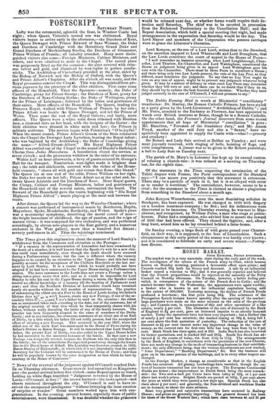The Times gives this explanation about the manner of Lord
Stanley's withdrawal from the Commons and elevation to the Peerage— "if a vacancy in the representation of Lancashire had been occasioned by the death of a member, it is well known that the Speaker's writ for a new elec- tion could issue immediately, even though the death should have occurred during a Parliamentary recess ; but the case is different where the vacancy happens to be created by an elevation to the Upper House; and this fact may possibly account for the acceptance of the Chiltern Hundreds at the last mo- ment by Lord Stanley. It is a course which he would probably not have adopted if he had been summoned to the Upper House during a Parliamentary session. The mere summons to the Lords does not create a Peerage unless a sitting takes place under that writ ; and as it would be impossible for Lord Stanley to take his seat in the Upper House during a recess, the Speaker could receive no official knowledge of a vacancy till the meeting of Parliament next year; and thus the Northern Division of Lancashire would have remained nearly six months without its full number of representatives. The practice of summoning the eldest son of a Peer to the House of Lords during his father's lifetime does nr a., is w&] known, create any new Peerage, if one of the se- condary titles -coung teer's father be used on the occasion : the eldest son so summoned takes rank according to the date, not of the summons, bat of the original creation of that title which he thus temporarily shares with his father, without really denuding the latter of any of the family honours. The practice has been frequently adopted in the cases of members of the Derby family ; and in one instance, the erroneous summons of an eldest son of an Earl of Derby, by a title which his father did not really possess, had the unexpected effect ot creating a new Peerage. This occurred in the year 1627, when the eldest son of the sixth Earl was summoned to the House of Peers during his father's lifetime as Baron Strange. It will be remembered that Lord Stanley's father, the present Earl of Derby, was also called to the Upper House before he had succeeded to the ancestral honours of the family. In that case a new Peerage w as designedly created, because the Earldom was the only title then in the family ; for all the subordinate Peerages had passed away through the female line to the Ducal house of Atholl. His Lordship was therefore created, in 1832, Baron Stanley of Bickerstaffe; in which title it is not improbable that the noble Secretary for the Colonies will be summoned to the House of Peers; and thus he will be popularly known by the same designation as that which be bore by courtesy in the House of Commons."


























 Previous page
Previous page